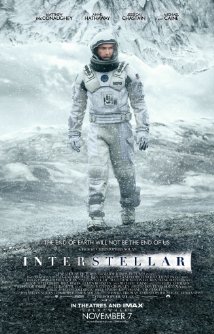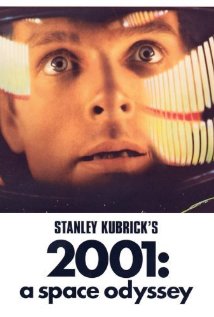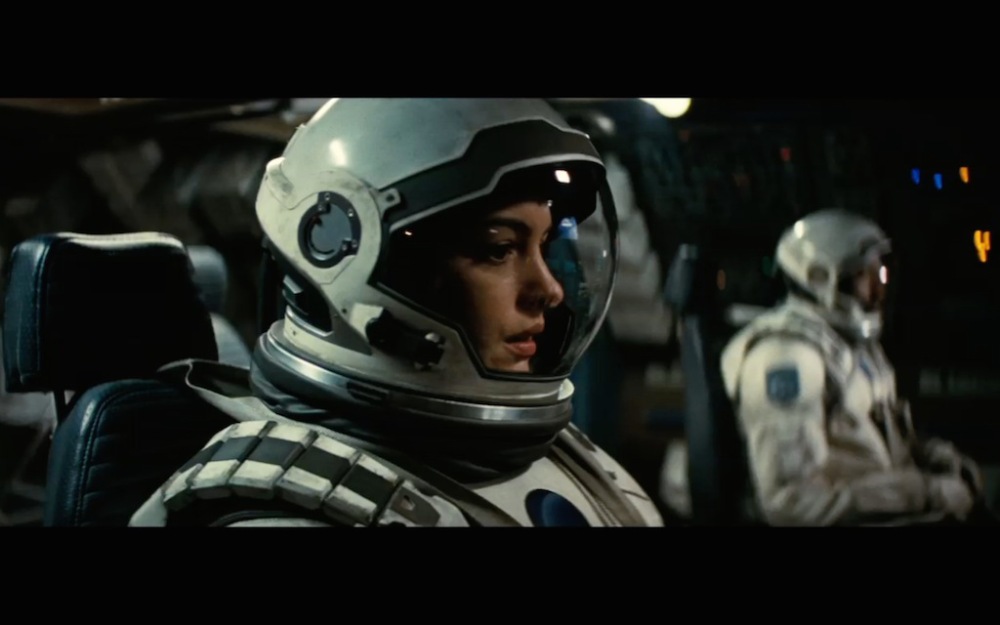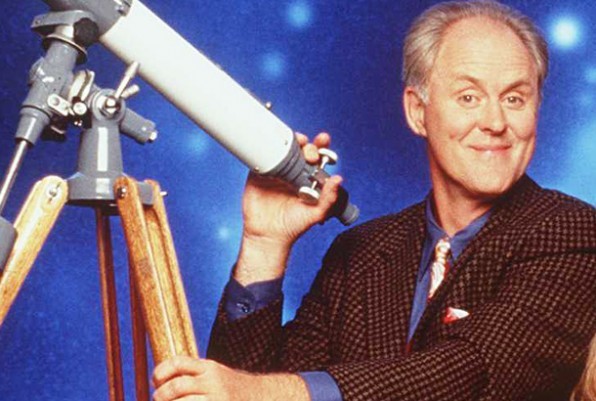Liftoff: “Interstellar” (2014)
 In 2014 , Christopher Nolan has set out on a new journey in a new direction. In “Interstellar,” he charts a course for unknown territory, expanding his horizons.
In 2014 , Christopher Nolan has set out on a new journey in a new direction. In “Interstellar,” he charts a course for unknown territory, expanding his horizons.
It’s fitting that in his first film that veers away from unsavory characters and cops and crooks, he chooses a genre that’s historically been all about exploration and visions of the future. His vision is rather original. Whereas most space movies dream about the distant future, Nolan explores a future that might not be too far off.
It’s strange that it’s easier to consider robots, advanced technology, and tearing across the galaxy at warp speed than it is to consider what the beginnings of intergalactic exploration might look like. That’s probably partly because directors don’t want to get it wrong and have their work look outdated in a few decades, like all those scifi guys in the 60s, 70s and 80s who tried to predict what the current millennium might look like. It’s ironic and sad that there’s talk of Justin Bieber going to space in the future, whereas Stanley Kubrick, who famously envisioned what a futuristic space program might look like, never got to.
Nolan pushes his audience a few generations down the line to show us what the future might hold on earth. With the recent technological boom, all of earth’s (or just the U.S.’s, it isn’t certain) kids grow up to be engineers, and with all of humanity’s eggs in that basket, food production seems to have been neglected. Nolan has always attempted to draw even his most outlandish films with realism. This future that he’s envisioned seems like a realistic one, considering the current demand for technology. The cool thing to do is to right now is to work for Facebook or Google or any upstart social media group, as opposed to boring, yet essential occupations, such as farming. So, it’s an interesting setting (prediction?) Nolan has come up with, and it sets up for a dire story when things inevitably begin to go wrong for the earthlings.
But for the themes of exploration and moving on, it’s a bit disappointing that the film is, ironically, rather grounded in many ways. It’s trapped by similar movies that have come before, and Nolan fails to do anything particularly exciting to push the genre along. And at a running time of 169 minutes, it feels like more should have happened in that lengthy span.
Of course, there are lots of Star Trek clones that involve a crew traveling through space. Though those types of shows and films are interesting because they create aliens with their own complete civilizations and a look at what humanity might be like in such an environment. It’s not as if the world needs more of those necessarily. “Interstellar” might in some ways serve as a bridge between current reality and space operas. It’s humorous when one member of the ship’s crew goes into cryostasis for the first time and another member looks a bit unsure about getting into the tube himself.
A major problem is that there’s no real direct conflict. When the film does try to drum up conflict, it feels manufactured and unnecessary. A movie about exploration doesn’t necessarily need human conflict, but it pops up at strange points and rarely pushes toward that theme of exploration. In fact, it kind of holds the film back and keeps it from reaching heights that it could. When the film concerns itself with father-daughter drama, it could be spending its time exploring other worlds. It’s not so much that the film didn’t do what Nolan intended it to, it’s that the ideas Nolan went for often aren’t that compelling or have been done elsewhere and better.
That’s not to say “Interstellar” is a bad film by any stretch. It’s technically marvelous. It doesn’t insult the viewer’s intelligence in the way that say, “Oblivion” did by mashing a bunch of scifi cliches together mostly in the last third of the movie. There are good points about it. It seems as if Nolan tried to make the film a jack of many trades, but it ended up being a master of few.
It does to do some things that haven’t been explored in a realistic sense in space films, such as when Matthew McConaughey and company steer their ship into a worm hole. If you’re interested in how good the science is in this movie, look no further than Neil deGrasse Tyson’s series of Tweets about it. If he says it’s good, then you’ve gotta trust that man.
The most compelling idea the movie addresses is its theme of survival. Namely, what does survival mean, not only for individual people, but for the entire human species? Where does survival shift from preserving what is to focusing on what will be, and where should the line be drawn between those two philosophies? When should humanity abandon one of those philosophies for the other? The movie kind of seems to go with a softball answer of doing both (although that may change depending on one’s reading of the ending), which is probably the correct answer in most cases, but if you’re going to raise a situation where that becomes a dilemma, then it would be nice to explore possibilities other than the most pragmatic one to see where that idea goes.
On the other hand, there are a lot of mysterious happenings that help set up the film, and it seemed like it would lead to interesting questions about the origins of those things that didn’t necessarily need answers. But the film answers them, and it turns out they were in some ways more and less mysterious than originally thought, but in a way that leads to more of a facepalm than any awe or wonder. It’s one of those cases where the mystery was more compelling than any answer would quench, but Nolan couldn’t leave it at that.
You can’t complain about the acting for sure. Being a country boy is what McConaughey is, and being a country boy is what he does best. Being a country boy is what his character, Coop, is here, and he does it well. Seriously, he is impressive here, and does his best to sell his character even when the character is put into somewhat absurd situations. The Academy swooned over his performance in “Dallas Buyers Club,” and many people got really excited over “True Detective,” but with the range of emotions he conveys here, McConaughey probably should be looking at another nomination, as it might be some of his best work, but he probably won’t get the recognition this time.
Anne Hathaway as Dr. Brand is fine as his astronaut partner. She has her moments an actor, and she’s OK here (although her dissertation on how love is the key to future is horrible and is best forgotten), but the biggest problem with her is that she doesn’t look like an astronaut. Astronauts are the ultimate combination of intelligence and athletics. You can’t really say what intelligence looks like, but skin and bones Hathaway does not look like an astronaut. McConaughey has that athletic build with his ripped upper body that he’s showed of in photos on the beach, so he’s pretty believable as an astronaut. Note, that’s not at all to say that women can’t be astronauts because there are many female astronauts. But, let’s be honest, probably none of them look like Anne Hathaway.
Jessica Chastain is pitch perfect as a NASA scientist, and it’s a joy when she and some other notable Hollywood names pop up, especially if you don’t know they’re in the movie (stay off of IMDB!).
There were two other crew members on the mission with Coop and Dr. Brand, but those two were obviously not as important, because the movie didn’t bother to go into much detail about who they are or give them anything particularly important to do. It might have been nice if those characters had been fleshed out a bit more, but they weren’t.
And that meanie Nolan just keeps making that nice gentleman Michael Caine cry over and over. Could someone please make that jerky jerk stop making that old man cry? He needs to learn respect for his elders.
The biggest problems with the film arise when the movie makes it all but completely obvious where it’s headed but then still expects the audience to be surprised when it gets there. If it were chess, the viewer would be able to see three or four moves ahead what Nolan is trying to do, but he doesn’t shift his strategy or anything to compensate. Some of his previous films were all about twists, which he executed well. He could stand to make a film that’s more straight-forward, but every time a major event begins in the film, anyone who’s watched their share of movies should know exactly where it’s going. When it gets there, it’s not very interesting. When there’s a reveal late in the film, it seems like the movie wants you to think it’s something very sinister. But it isn’t, and it isn’t all that surprising of a reveal. That’s a little disappointing coming from the guy who made “Memento.”
Although it is a Nolan movie, it would be a spoiler to talk about how many women get killed in the movie, so let’s just go with what the audience is given from the beginning. Coop’s wife died before the movie began, so Coop could have a difficult relationship with his children because he’s a single father. That leads to a fairly important development in the film, but it’s another case of a woman who doesn’t even get to be a character used for the man’s character development. Blech.
The film does end on an ambiguous, open-ended note, as is typical for Nolan. If you just take what the film presents, it might not seem that ambiguous, but considering the circumstances, there isn’t much certainty. Depending on the viewer’s reading, it can change the meaning of the entire movie and some key events. Either way, it’s in some ways both exciting and hopeful and also bleak and frightening. It’s one of Nolan’s most effective ambiguous endings, as different readings could present drastically different viewpoints of large parts of the film. It will be interesting to discuss those viewpoints in the future.
It is the case of a film probably being better the less you know going in, so stay off IMDB as stated earlier, and I tried to keep it pretty spoiler free here. It was a major victory for Nolan to keep the promotional campaign as vague as possible for this movie, keeping a few big names off the poster, which again makes their inclusion all the more surprising and enjoyable. In a pop culture world where there are spoilers on every website, the way you go about these things counts as part of the audience’s experience, so kudos to Nolan for doing the best he could. Although Chastain’s presence being made public even seems like giving away too much.
This all is not intended to be jumping on the Nolan bashing bandwagon. If you’ve read thoughts on his other films on this site, you know that there are many great things he does as a director. If you’re a fan of his, you’ll see the movie anyway, and you’ll probably enjoy at least some parts of it. If you’re a Nolan hater, then nothing he does is going to satisfy you anyway. The movie is a mixed bag. Some of it is underwhelming, but also some of it is enjoyable. The worst thing is you might start wondering how many lightyears you could have traveled during the length of the film, as it really didn’t need to be three hours long. But that’s the way it is, and you’ll probably get over it.
Perhaps the most important thing to take away from “Interstellar” is actually a rather understated point. John Lithgow, in a great departure from the characters he typically plays, as Coop’s father represents probably the youngest of the existing generations. As the film is a look to the future, and as current older generations seem to understand so little about those who are young adults and younger, it serves as a good reminder to those who feel that previous generations were less than accepting of how the world has changed since they were young themselves. Each generation thinks that it’s going to be different from its parents generation and hopefully be accepting of the coming generations in the way that previous generations weren’t. This film, and Lithgow’s character specifically, show that it’s up to the current generation to carry their beliefs in open-mindedness into the future, and hopefully they don’t stand in the way of progress, no matter how absurd it will seem. If current young adults’ grandchildren are yearning to push to the furthest reaches of space, then if that happens to be a reality, they shouldn’t bury their heads in the corn and pretend it’s an impossibility. That’s the sort of idea scifi is about.
———————-
Note: I didn’t finish writing about Christopher Nolan’s previous movies before “Interstellar” came out. Sorry. Life gets busy sometimes, which makes it hard to stick to plans, no matter how well they are laid out. I’m still planning to get to his last three films I have yet to do. But I thought it was important to write about “Interstellar” while it’s still fresh.




